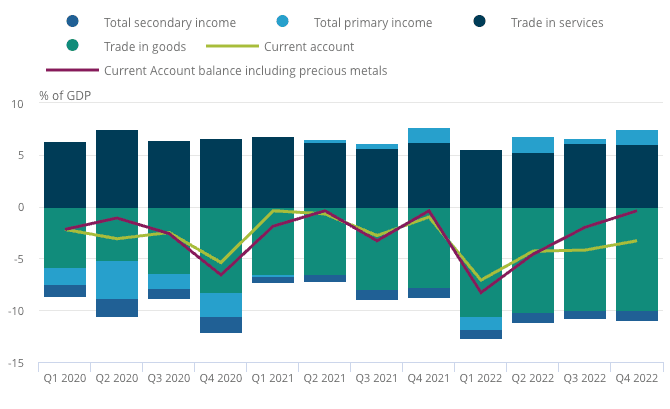Pound Sterling Outlook Brightens as Economic Growth Revised up, Current Account Deficit Falls Sharply
- Written by: Gary Howes
- UK GDP revised up in Q4 2022
- But economists say recession still likely in H1 2023
- Current account deficit falls
- Data maintains trend of improved UK economic data
- Could bolster GBP outlook

Image © Adobe Images
The UK economy grew in the final quarter of 2023 after the ONS revised higher its GDP figures, separate data meanwhile showed the UK's current account deficit shrank substantially in the quarter.
The current account deficit is considered one of the UK's 'twin deficits' that poses downside risks to the British Pound's outlook.
Therefore, news that it shrank to £2.5BN in the second quarter - from £12.7BN in the third quarter - could ease downside risks for the Pound.
Analysts were expecting the deficit to expand to -£17BN in the third quarter.

Above: "The UK’s current account deficit as a percentage of GDP narrowed in Quarter 4 2022." - ONS. Chart shows contributions to the UK’s current account balance as a percentage of gross domestic product, Quarter 1 (Jan to Mar) 2020 to Quarter 4 (Oct to Dec) 2022.
GDP growth was revised higher to 0.1% in the final quarter by the ONS, up from the first estimate of 0%.
For context, through the course of H2 2022 economists were overwhelmingly poised for the UK to record a negative figure in the quarter.
"The final Q4 2022 GDP data suggested the economy was even more resilient in 2022 than we previously thought, as the government absorbed some of the hit to households from high inflation," says Ruth Gregory, Deputy Chief Economist at Capital Economics.
The outcome, therefore, confirms a trend in the data which shows the economy is proving more resilient than expected.
Compare Currency Exchange Rates
Find out how much you could save on your international transfer
Estimated saving compared to high street banks:
£2,500.00
Free • No obligation • Takes 2 minutes
Pound Sterling is meanwhile 2023's best-performing currency, largely on account of a reappraisal of the UK's economic prospects over recent weeks as upside data surprises tend to nurture currency gains.
At the time of writing GBP/EUR is quoted at 1.1365, GBP/USD is near its 2023 highs at 1.2392.
The ONS said the UK's improved current account position was because of a £6.9BN widening of the primary income account surplus position, to £9.8BN, or 1.5% of GDP.
This as credits from direct investment abroad continued to recover, especially in the energy sector.
The upward revision to the GDP figure came on the back of a 0.1% increase in service sector output.
UK Economic Outlook: Recession Still Expected by Economists
Although the national accounts paint a picture of an economy that is far more resilient than the predictions made in 2022 would suggest, the outlook remains challenging.
The Bank of England has lifted interest rates to their highest levels since 2008, meanwhile, it is expected banks will tighten lending conditions in the wake of recent turmoils in the sector.
"We still think that about two-thirds of the drag of higher interest rates has yet to be felt and that the economy will slip into a recession involving a peak to trough fall of about 1.0% this year," says Gregory.
"Whether or not the economy does fall into a technical recession, a prompt recovery seems unlikely this year, especially if credit conditions tighten following the recent banking turmoil related to Silicon Valley Bank and Credit Suisse," says Investec's chief economist Philip Shaw.
Gabriella Dickens, Senior U.K. Economist at Pantheon Macroeconomics says the UK economy will likely contract in the first half of this year, resulting in the declaration of a technical recession.
"Business surveys and redundancy notification data suggest that employment will merely hold steady in Q1 and Q2, having edged higher in the second half of last year. The impact of the jump in mortgage rates on disposable incomes and residential investment also will build," says Dickens.
Furthermore, business investment is expected to remain subdued as the government's 'full expensing' tax break announced in the budget could be too late for near-term investment plans.
"We remain happy with our forecast for quarter-on-quarter falls in GDP of 0.1% in both Q1 and Q2," says Dickens.
Pantheon estimates the declines will be shallow as the Government announced it would continue providing energy bill support to households at existing levels; a previously planned tapering of the support would have resulted in a 1.0% hit to households’ real disposable incomes in Q2.
This is expected to boost disposable incomes this quarter.




